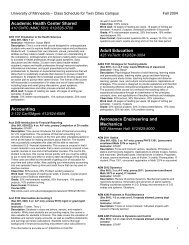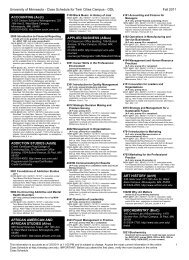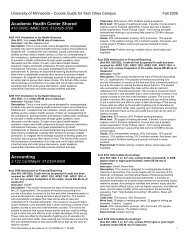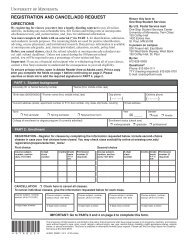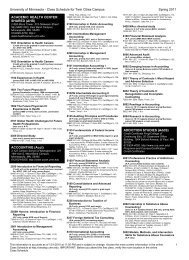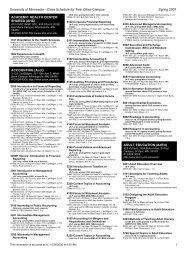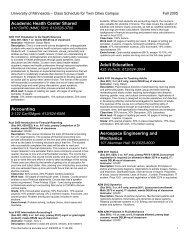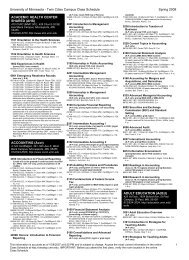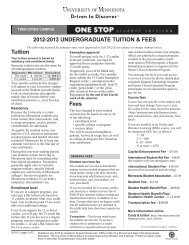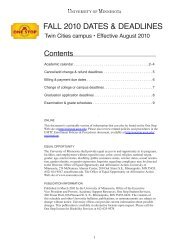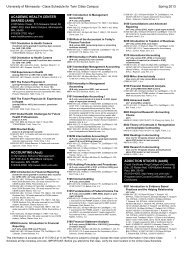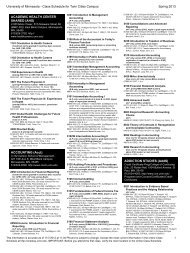Spring 2010 Class Schedule - One Stop Home - University of ...
Spring 2010 Class Schedule - One Stop Home - University of ...
Spring 2010 Class Schedule - One Stop Home - University of ...
Create successful ePaper yourself
Turn your PDF publications into a flip-book with our unique Google optimized e-Paper software.
<strong>University</strong> <strong>of</strong> Minnesota - Twin Cities Campus <strong>Class</strong> <strong>Schedule</strong> <strong>Spring</strong> <strong>2010</strong><br />
7300 Minnesota Journal <strong>of</strong> International<br />
Law<br />
(max crs 9; 4 repeats allowed; P-F only)<br />
60525 001 LEC; Gifford, Daniel J, 3 cr<br />
7302 Minnesota Journal <strong>of</strong> International<br />
Law Staff<br />
(max crs 6; P-F)<br />
90017 001 SEM, 1 cr<br />
7500 CL:Misdemeanor Defense<br />
(max crs 3; A-F only)<br />
60563 001 CLN, 03:35pm-05:30pm MW, Room TBA,<br />
TCWESTBANK, 01/19/10-04/28/10; Meets with: 60565<br />
LAW 7550; Simon, Steve Mark, 3 cr<br />
7501 CL: Misdemeanor Clinic Director<br />
(max crs 4; A-F only; prereq dept consent)<br />
64749 001 LEC, 01/19/10-04/28/10; Simon, Stephen, 2 cr<br />
7550 CL:Misdemeanor Prosecution<br />
(max crs 3; A-F only)<br />
60565 001 CLN, 03:35pm-05:30pm MW, Room TBA,<br />
TCWESTBANK, 01/19/10-04/28/10; Meets with: 60563<br />
LAW 7500; Simon, Steve Mark, 3 cr<br />
7572 Federal Defense Clinic<br />
(A-F; prereq Criminal law, criminal<br />
procedure/evidence; evidence course may be<br />
enrolled in concurrently)<br />
76853 001 CLN; Frase, Richard S, 3 cr<br />
7600 Minnesota Journal <strong>of</strong> Law, Science,<br />
and Technology<br />
(max crs 6; 4 repeats allowed; P-F only)<br />
63875 001 LEC; Wolf, Susan M, 3 cr<br />
7675 CL: Child Advocacy<br />
(max crs 7; A-F only)<br />
64751 001 CLN, 01/19/10-04/28/10; Sanderson, Jean M, 3<br />
cr<br />
7676 CL: Child Advocacy Director<br />
(max crs 4; A-F only; prereq dept consent)<br />
64753 001 LEC, 01/19/10-04/28/10; Sanderson, Jean M, 2<br />
cr<br />
7842 CL: Immigration and Human Rights<br />
(max crs 14; A-F only)<br />
62397 001 LEC, 03:35pm-05:30pm T, Room TBA,<br />
TCWESTBANK, 01/19/10-04/28/10; Keller, John<br />
Charles, 3 cr<br />
7843 CL: Immigration Clinic Director<br />
(max crs 4; A-F only; prereq dept consent)<br />
64755 001 LEC, 01/19/10-04/28/10; Ellingson, Karen F, 2<br />
cr<br />
7850 CL: Public Interest Law<br />
(A-F only)<br />
67027 001 CLN, 03:35pm-05:30pm T, Room TBA,<br />
TCWESTBANK, 01/19/10-04/28/10; Bogucki, Monica<br />
Mary, 2 cr<br />
7860 CL: Multi-Pr<strong>of</strong>ession Business Law<br />
(max crs 8; A-F only)<br />
71217 001 LEC, 01/19/10-04/28/10; Alton, Mary, 3 cr<br />
7950 CL: Tax Clinic<br />
(max crs 4; A-F only)<br />
60569 001 CLN, 12:15pm-01:05pm W, Room TBA,<br />
TCWESTBANK, 01/19/10-04/28/10; Tax Clinic II; Sedo,<br />
Kathryn J, 3 cr<br />
7951 CL:Tax Clinic Director<br />
(max crs 4; A-F only; prereq dept consent)<br />
64757 001 LEC, 01/19/10-04/28/10; Sedo, Kathryn J, 2 cr<br />
LEARNING AND ACADEMIC<br />
SKILLS (LASk)<br />
104 Eddy Hall, 192 Pillsbury Drive SE, East<br />
Bank Campus, Minneapolis, MN, 55455<br />
612/624-7546, http://www.uccs.umn.edu/<br />
education/sass.htm<br />
1001 Mastering Skills for College<br />
Success<br />
64501 001 LEC, 10:10am-11:00am MW, ApH 319, 2 cr<br />
64503 002 LEC, 11:15am-12:05pm MW, ApH 319, 2 cr<br />
64505 003 LEC, 03:35pm-04:25pm MW, ApH 319, 2 cr<br />
64509 004 LEC, 11:15am-12:05pm TTh, ApH 319, 2 cr<br />
67777 005 LEC, 02:30pm-03:20pm TTh, ApH 319, 2 cr<br />
64511 006 LEC, 12:20pm-02:15pm W, ApH 319, 2 cr<br />
64507 !007 LEC, 06:20pm-08:10pm W, ApH 219, 2 cr<br />
1101 Academic Refresher<br />
(S-N only; prereq instr consent)<br />
64605 001 LEC; For information and permission numbers,<br />
call 612 624 3323., 1 cr<br />
92696 003 LEC; Slattery, William Scott, 1 cr<br />
1102 Academic Success<br />
(max crs 4; S-N; prereq instr consent ; preference<br />
given to students on academic probation or<br />
returning from academic suspension)<br />
88545 001 LEC; For information and permission numbers,<br />
call 612 624 3323.; Slattery, William Scott, 2 cr<br />
90229 002 LEC; For information and permission numbers,<br />
call 612 624 3323.; Slattery, William Scott, 2 cr<br />
90231 003 LEC; For information and permission numbers,<br />
call 612 624 3323.; Slattery, William Scott, 2 cr<br />
LIBERAL STUDIES (LS)<br />
20 <strong>Class</strong>room Office Building, 1994 Buford<br />
Avenue, St Paul Campus, St Paul, MN,<br />
55108<br />
612/626-8724, http://www.cce.umn.edu/mls<br />
5100 Liberal Studies Seminar<br />
(max crs 24; 24 repeats allowed; A-F only; prereq<br />
dept consent)<br />
61279 !001 SEM, 06:20pm-08:50pm T, BlegH 205; All<br />
for <strong>One</strong> and All for All: Promoting the General Welfare in<br />
the 21st Century- The U. S. Constitution states that<br />
it is the job <strong>of</strong> the federal government to "promote the<br />
general welfare." What does that mean to you In our<br />
environmentally, politically, economically, culturally and<br />
technologically interconnected world, what ought it<br />
mean What kind <strong>of</strong> a system ought we as citizens build<br />
and promote to ensure effective, efficient and equitable<br />
use <strong>of</strong> resources, fair competition and an adequate<br />
response to global challenges such as climate change<br />
These are the central questions with which we will be<br />
working. In any discussion <strong>of</strong> ethics and values, which<br />
this must necessarily be, a lot <strong>of</strong> the dialogue must be<br />
focused on defining our terms. We must have common<br />
pictures <strong>of</strong> what we're talking about to have a coherent<br />
conversation about anything. How do you define welfare<br />
state The general welfare The common good Public<br />
and private goods Capitalism Socialism Social<br />
welfare Democracy What does it mean to be a liberal<br />
or a conservative How does democracy as a political<br />
system comport with capitalism as a form <strong>of</strong> resource<br />
allocation What is globalization and how does it relate<br />
to these systems Is capitalism the same as free<br />
markets What are the ideal relationships between the<br />
state, markets and society Explore the many ways in<br />
which you can look at the world, how forces new and old<br />
drive change in the world and how those forces<br />
themselves change. Identify questions we must ask if we<br />
are to cope effectively with change and build systems <strong>of</strong><br />
governance and resource allocation that are sustainable<br />
and both protect and inspire each <strong>of</strong> us as citizens., 3 cr;<br />
Promoting the General Welfare in the 21st Century<br />
61281 !002 SEM, 06:00pm-08:30pm W, BlegH 210, 01/20/<br />
10-05/07/10; Escape Artists and Culture Bearers:<br />
The American Fault Line- Explorers, visionaries,<br />
escape artists--American history is full <strong>of</strong> them. They've<br />
shaped politics, art, literature and social change.<br />
Consider what it means to defy social norms in American<br />
terms, reading about leaders <strong>of</strong> revolt from Nat Turner's<br />
slave revolt to women leaders <strong>of</strong> labor resistance. We'll<br />
consider escapists who traveled into southseas oceans<br />
and European civilizations--Melville, Edith Wharton--and<br />
the fiction they wrote about their voyages. The lives <strong>of</strong><br />
visionaries, such as the Mormon founder, Joseph Smith,<br />
will be examined. Contrasting to this impulse is that to<br />
make community, to replicate cultures, to celebrate<br />
union. Some <strong>of</strong> the country's finest art and literature<br />
have arisen from communities very alive to their<br />
identity--Native American bands; early New England<br />
villages and the transcendental community <strong>of</strong> Brook<br />
Farm, the Harlem Renaissance and its community <strong>of</strong><br />
writers and artists; the communities who worked for civil<br />
rights in the South, and planned communities built by<br />
businesses on the Iron Range. We'll probe the fault line<br />
where community disintegrates--Native American<br />
white-run boarding schools; suburban distress, and<br />
where the escape artist turns into a lawless renegade.<br />
What will emerge are some <strong>of</strong> the country's most<br />
exposed and most enduring traits.; Galt, Margot Kriel, 3<br />
cr; Escape Artists and Culture Bearers<br />
61283 !003 SEM, 06:00pm-08:30pm W, BlegH 105, 01/20/<br />
10-05/07/10; Another Time: The Twentieth Century<br />
as History - A conscious imaginative attempt to bring<br />
historical perspective to the meaning <strong>of</strong> the events<br />
between the year 1900 and 2000. The first purpose <strong>of</strong><br />
the seminar will be to identify the most significant ways in<br />
which human experience changed in the last century,<br />
creating and using criteria to judge their significance. The<br />
second purpose will be to critically examine why our best<br />
judgments concerning this are nevertheless provisional<br />
because, while the past does not change, its<br />
interpretation does. Gain a comprehensive<br />
understanding <strong>of</strong> the century and its legacy and also a<br />
deeper appreciation <strong>of</strong> the important and difficult task <strong>of</strong><br />
making sense out <strong>of</strong> human events, even when (perhaps<br />
especially when) there is so much material to consider.;<br />
Amram, Fred M; Shupe, David Arlin, 3 cr; Another Time:<br />
The 20th Century as History<br />
68127 !005 SEM, 06:20pm-08:50pm T, BlegH 105, 01/19/<br />
10-03/13/10; Exploring Life's Foundations - The<br />
philosopher, Socrates, famously remarked, "The<br />
unexamined life is not worth living." Although we all have<br />
basic foundations upon which we, consciously and<br />
unconsciously, build our life experiences, these<br />
foundations <strong>of</strong>ten tend to be taken for granted and<br />
remain mostly unexplored. Examine the core<br />
fundamentals upon which we define ourselves,<br />
individually and as a society, through readings, class<br />
discussions and experiential activities, and gain an<br />
understanding <strong>of</strong> the basic, usually unquestioned and<br />
largely unexamined framework that underlies the unique<br />
perceptual framework and experiences <strong>of</strong> themselves<br />
and <strong>of</strong> others. Explore the ideal methods <strong>of</strong> gaining<br />
knowledge within that context, and in the process<br />
delineate the basic foundations <strong>of</strong> knowledge, perception<br />
and belief. Through shared exploration, utilize multiple<br />
approaches that encourage student-centered learning<br />
and integrate source materials from the fields <strong>of</strong> Eastern,<br />
Western and Native Philosophy and Theology as well as<br />
from Anthropology, Epistomology, Psychology and<br />
Cross-Cultural Studies.; Lorenz, Karl W; Dikel, William<br />
Robert, 2 cr; Exploring Life's Foundations<br />
83855 !007 SEM, 06:20pm-08:50pm M, Room TBA,<br />
TCWESTBANK, 03/22/10-05/07/10; Where We Live:<br />
Documenting Changing Communities - Investigate<br />
how the culture, commercial and architectural<br />
environment has changed in the towns <strong>of</strong> Greater<br />
Minnesota and neighborhoods <strong>of</strong> the Twin Cities.<br />
Choose an individual community to explore and research<br />
through historic images and maps, public data and oral<br />
histories. Using the resources <strong>of</strong> historical societies,<br />
libraries and online collections you will establish a picture<br />
<strong>of</strong> life in their community in earlier eras and then<br />
document the same locations today. From these images,<br />
research, and interviews investigate and try to answer<br />
the causes and effects <strong>of</strong> our rapidly changing cultural<br />
and built environment. Explore some <strong>of</strong> the causes <strong>of</strong> the<br />
changing face <strong>of</strong> our communities such as the<br />
emergence and challenges <strong>of</strong> "big box retailers,"<br />
immigration, interstate freeways, departing industries,<br />
the farm crisis <strong>of</strong> the 1980s and the subsequent decline<br />
<strong>of</strong> rural economies.; Husom, David Harold, 2 cr; Where<br />
We Live: Documenting Changing Communities<br />
92181 !008 SEM, 06:20pm-08:50pm M, BlegH 430, 03/22/<br />
10-05/07/10; Sustainability - Sustainability looks<br />
at a wide range <strong>of</strong> environmental issues facing the nation<br />
and world today with an eye toward solutions. The term<br />
means doable over the long run, over generations, and<br />
in practice "sustainability" typically means a kind <strong>of</strong><br />
business-friendly environmentalism. That makes it easier<br />
to adopt new ideas, once the spirit moves a community<br />
to attempt change. A business-friendly yet genuine<br />
environmentalism makes projects easier to approve and<br />
implement. Businesses see a way to stay in business,<br />
and when environmentalists are sensitized to cost<br />
considerations and the price <strong>of</strong> change, they too can<br />
support easier, longer lasting solutions. Examine energy<br />
issues, water, topsoil, forests, fisheries and agricultural<br />
issues, biodiversity and dilemmas posed by GMO foods,<br />
atmospheric issues like global warming and ozone<br />
depletion, and concepts like "Natural Capitalism."; Smith,<br />
Tim, 2 cr; Sustainabilty<br />
5125 Field Experience<br />
(max crs 8; A-F only; prereq MLS student or instr<br />
consent)<br />
68209 001 FWK, 1-8 cr<br />
5950 Special Topics<br />
(max crs 12; 3 repeats allowed; A-F only; prereq dept<br />
consent)<br />
85795 001 SEM, 09:00am-03:00pm S, BlegH 115, 03/06/<br />
10-03/06/10; The Future <strong>of</strong> the <strong>University</strong> and the State -<br />
Examines how tertiary education interacts with and<br />
impacts the community, the state, the nation, and the<br />
world. Explore trends that demonstrate the agendas<br />
through which tertiary institutions have negotiated their<br />
relationships with their social, economic, and cultural<br />
contexts. Using social science and innovation studies<br />
concepts and models, the seminar examines how these<br />
important relationships might evolve in the future. We will<br />
also explore selected 'wild card' tertiary education futures<br />
- those driven by surprises rather than by discernable<br />
trends.; Meets with: 88669 IS 5950; Seashore, Karen<br />
Rose; Harkins, Arthur M, 1 cr; The Future <strong>of</strong> the<br />
<strong>University</strong> and the State<br />
93419 002 SEM, 09:00am-03:00pm S, BlegH 105, 04/10/<br />
This information is accurate as <strong>of</strong> 11/3/2009 at 11:00 PM and is subject to change. Access the most current information in the online<br />
<strong>Class</strong> <strong>Schedule</strong> at http://onestop.umn.edu. IMPORTANT: Before you attend the first class, verify the room location in the online<br />
<strong>Class</strong> <strong>Schedule</strong>.<br />
114



